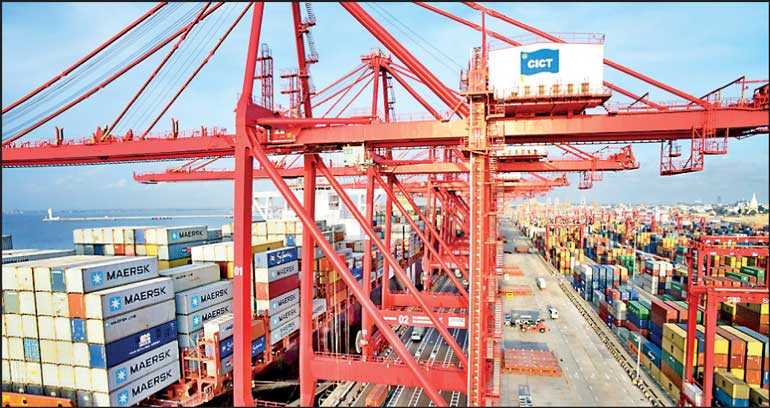Wednesday Feb 18, 2026
Wednesday Feb 18, 2026
Friday, 14 December 2018 00:04 - - {{hitsCtrl.values.hits}}

Colombo International Container Terminals (CICT) yesterday announced a significant equipment addition that will enhance the terminal’s deep water capacity and make Colombo one of the few ports in Asia capable of handling vessels of 22,000 + TEUs. The Company said the enhancement encompasses the addition of two new mega Quay Gantry Cranes (QGCs), six new Rubber-tyred Gantry Cranes (RTGs) and 12 Prime Movers, and is planned for completion by March 2019. CICT’s existing QGCs are the biggest gantry cranes in the Indian Subcontinent region, and the addition of two even larger twin-lift QGCs from Zhenhua Port Machinery Company (ZPMC), a global leader in quayside container cranes, will further strengthen the Port of Colombo’s hub status, the Company said.
The new QGCs will provide a lifting height of 54 metres above rail level and 18 metres below rail level with an outreach of 26 across and a lifting capacity of 65 tons, making it possible for the Colombo South container terminal managed by CICT to unload and load 22,000 + TEU vessels, the largest container carriers afloat.
To support the estimated 13% consequent increase in CICT’s capacity, the Company has also announced plans to strengthen quayside and yard operations with the acquisition of the six new RTGs also manufactured by ZPMC, which can stack one container over six containers high and one container across six containers width, and to deploy an additional 12 Prime Movers as Terminal Tractors.
“This improvement of capacity and upgrade of facilities at a time of global economic uncertainty is an emphatic demonstration of our commitment to the Port of Colombo, and reflects how serious we are about continuing to be the major contributor to the port’s bid to be a major transhipment hub,” CICT CEO Jack Huang said.
“CICT has taken the initiative to boost the Port’s deep water capacity within just five years of commencement of operations, at a time when other ports in the region are aggressively adding capacity. Demand for deep water facilities is increasing at a rapid pace and requires the quick response that only CICT is able to provide.”
Huang added that besides enabling the port to attract larger vessels, this addition will generate more capacity and berthing space by turning ships around faster.
CICT is already the principal contributor to growth at the Port of Colombo, having achieved one million TEUs and two million TEUs respectively in its first two years of operation and generated a 14% growth for the port after four years of static growth. CICT has also set benchmark productivity levels for the region achieving 36 moves per hour and helping the Port of Colombo move from a rank 28th to 23rd among the world’s best 30 ports, and from 18th to 13th for connectivity.
Besides its significant contributions to the growth of the Port of Colombo in volume terms, CICT is also responsible for several firsts in service innovation and eco-friendly operations. In early 2016, the company launched a $ 10 million programme to convert its fleet of diesel operated rubber-tyred-gantry cranes to electricity driven rubber-tyred gantry cranes (E-RTGs) which have zero carbon emissions.
CICT was also the first terminal in the Port of Colombo to introduce electronic boat notes, breaking new ground in efforts to reduce paper in export documentation, as well as the first to launch a mobile app for the purpose of keeping track of containerised cargo at the terminal.
Recently adjudged the Best Container Terminal in Asia in the Under 4 million TEUs at the Asian Freight, Logistics and Supply Chain (AFLAS) Awards, CICT, which commenced operations in July 2013, manages the Colombo South Terminal of the Port of Colombo, the first and currently the only deep water terminal in South Asia equipped with facilities to handle the largest vessels afloat. The company is managed by CMPort, the world’s second largest terminal operator, through which it has access to a wide network of 34 ports across the globe, none of which are in any form of competition with the Port of Colombo.
In its last four years of operation, CICT has brought some of the largest vessels plying the Asia-Europe routes to Colombo. Of these, Milan Maersk (20,568 TEU), MSC Maya (19,224 TEU), Mogens Maersk (18,300 TEU), MSC New York (16,652 TEU), CMA CGM Marco Polo (16,020 TEU), Edith Maersk and EMC Thalassa Hellas (each 14,000 plus TEUs) and their sister vessels are now regular callers at CICT.